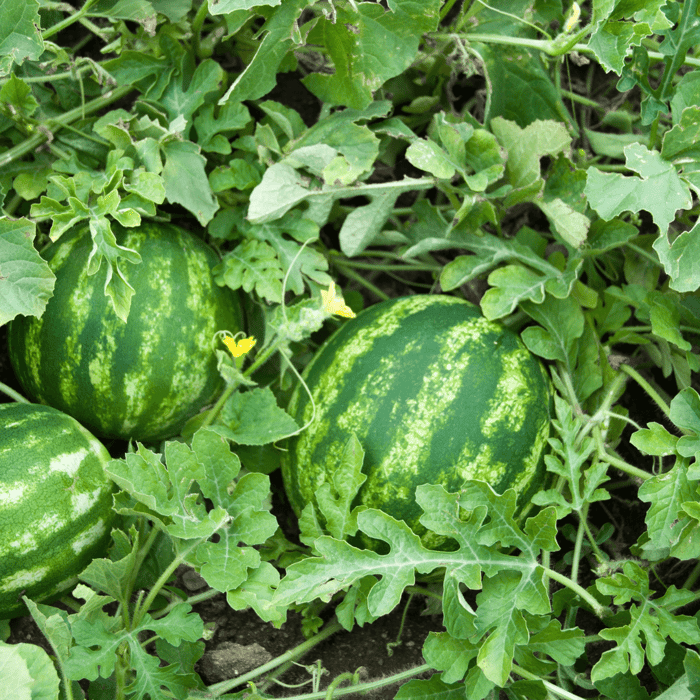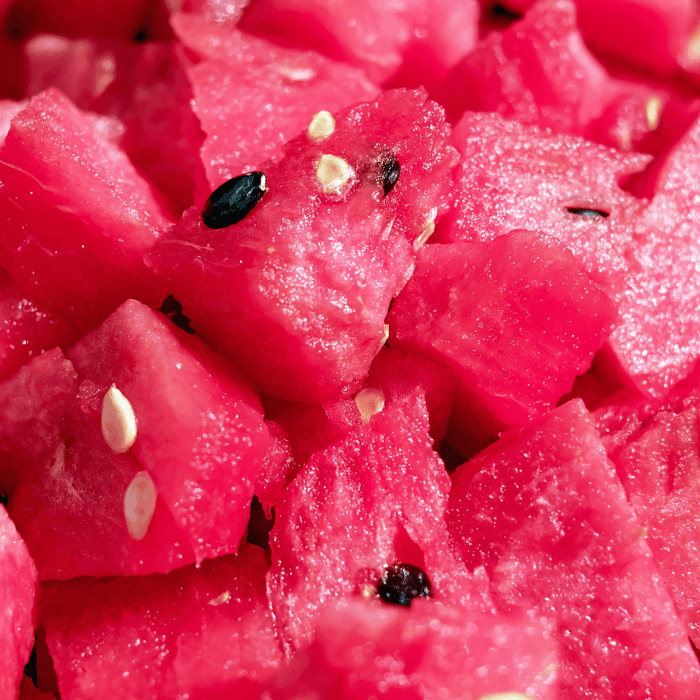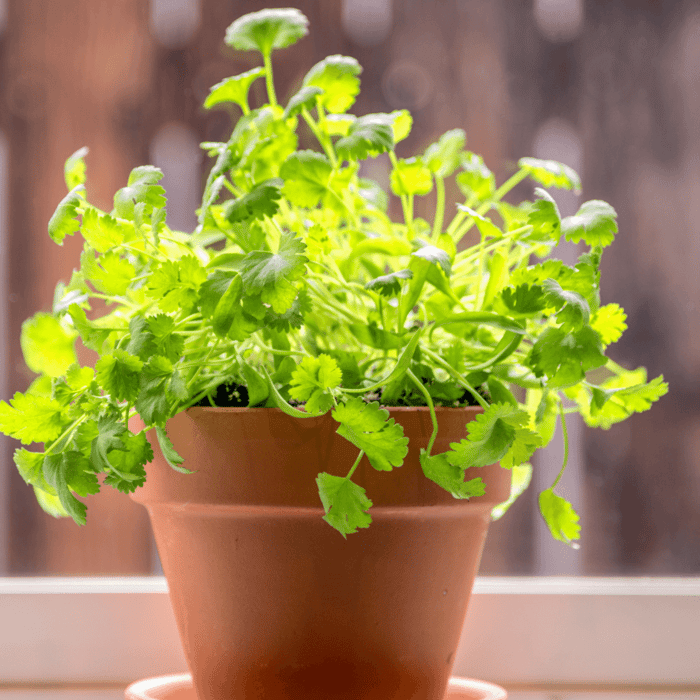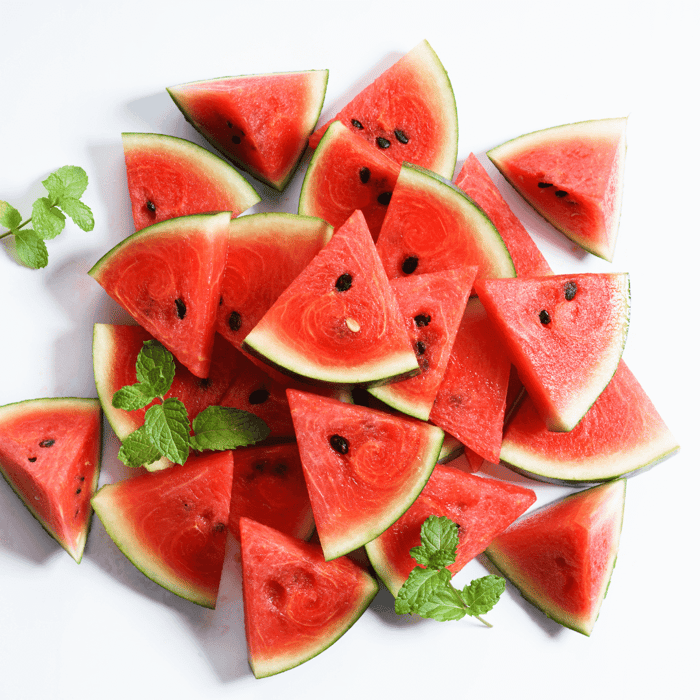Brief Overview of Watermelon Companion Planting
Watermelon companion planting is the practice of growing certain plants together with watermelons to enhance their growth and improve their yield. Companion planting has been used for centuries, and it works by creating a mutually beneficial environment for plants planted close to each other. What are the best watermelon companion plants you may be wondering? Stick around to find out.
In the case of watermelon companion planting, certain plants act as natural repellents to pests that may damage or reduce the yield of watermelons. Additionally, some plants add nutrients to the soil, which can boost watermelon growth and reduce disease.
Importance of Companion Planting for Watermelons
Companion planting is important for watermelons because it helps protect these delicate plants from pests and diseases that can affect their growth and production. It also helps in conserving soil nutrients as well as preventing erosion. Using companion plants also reduces the need for chemical pesticides that can harm humans and wildlife.
Using natural methods, watermelon growers can produce healthier fruits while maintaining a safer environment. Furthermore, companion planting encourages biodiversity in gardening practices, promoting a healthy ecosystem with fewer pest problems.
Overall, companion planting is an easy way to improve your garden output without extra effort or cost. By choosing compatible plant companions with your watermelons, you will see improved outcomes in your harvest while benefiting from a more diverse garden ecosystem.
Assorted Melon Seeds | 5 Variety Pack

$9.95
Grow Fresh Summer Melons with Our 5-Pack Heirloom Melon Seeds Assortment Are you looking to add some variety to your home garden? Our melon fruit seeds 5 variety pack includes a mix of delicious and nutritious melon seeds that are… read more
Best Companion Plants for Watermelons
Watermelon plants grow vigorously and produce delicious fruits under the right conditions. One way to enhance the growth and quality of watermelon plants is by companion planting.
Companion planting involves growing compatible plants near each other to achieve mutual benefits, such as pest control, enhanced nutrient uptake, and improved soil structure. Here are the best companion plants for watermelons:
Nasturtiums: The Perfect Pest Control Partners
Nasturtiums are beautiful, edible flowers that add color to any garden. They have a pungent scent that repels aphids, whiteflies, cucumber beetles, and squash bugs—the most common pests that attack watermelon plants.
Planting nasturtiums around your watermelon patch can reduce the risk of pest infestations while attracting beneficial insects like bees and ladybugs. To plant nasturtiums with watermelons, sow seeds directly into the soil about 1 inch deep and 12 inches apart after all danger of frost has passed.
Nasturtiums prefer well-draining soil with full sun exposure but can tolerate partial shade in hot climates. Water regularly, but do not overwater, as this can cause root rot.
Marigolds: The Soil Enrichers
Marigolds are another popular companion plant for watermelons because they attract beneficial insects like ladybugs and pollinators while repelling nematodes. These microscopic worms attack watermelon roots. Additionally, marigolds excrete chemicals from their roots that suppress harmful pathogens in the soil. To plant marigolds with watermelons, scatter seeds on top of well-draining soil or potting mix about 6-8 inches apart after all danger of frost has passed.
Marigolds prefer full sun exposure and moderate watering. Deadhead spent flowers to encourage continuous blooming.
Sugar Baby Watermelon Seeds

$2.49
Heirloom Sugar Baby Watermelon Seeds – Sweet, Compact, Non-GMO – Perfect for Small Gardens Get ready to grow your own delicious, sweet, and juicy watermelons with our Sugar Baby Watermelon seeds! These seeds are non-GMO, non-hybrid, and open-pollinated, perfect for gardeners… read more
Beans: The Nitrogen-Fixers
Beans are another excellent companion plant for watermelons because they are nitrogen-fixers-their roots host bacteria that convert atmospheric nitrogen into a form that plants can absorb. Nitrogen is a vital nutrient for watermelon plants, promoting leaf growth, stem development, and fruit size. To plant beans with watermelons, sow bean seeds directly into the soil about 1 inch deep and 4-6 inches apart after all danger of frost has passed.
Beans prefer well-draining soil with full sun exposure and moderate watering. Provide support like trellises or stakes for climbing varieties.
Planting nasturtiums, marigolds, or beans with your watermelons can provide numerous benefits, such as pest control, soil enrichment, and increased nutrient uptake. By following these simple planting and care tips, you can create a thriving garden that produces delicious watermelons year after year.
Plants to Avoid Planting Near Watermelons
If you want a bountiful watermelon harvest, it's important to remember that not all plants make good companions for watermelons. Some plants can actually have negative effects on the growth and production of your watermelon plants. Here are two types of plants that you should avoid planting near your watermelons.
Nightshades (tomatoes, peppers, eggplants)
The nightshade family includes tomatoes, peppers, and eggplants. While these vegetables may be delicious and nutritious, they don't play well with others regarding companion planting with watermelons. Nightshades are not good companion plants for watermelons because they both require similar nutrients from the soil.
If you plant them together in the same soil bed, they will compete for resources like nitrogen and potassium. This competition can result in stunted growth and reduced yields for both plants.
Nightshades are also susceptible to a type of root-knot nematode that can also damage the roots of your watermelon plants. This can further weaken your watermelon crop and reduce its overall health.
Brassicas (cabbage, broccoli, cauliflower)
The brassica family includes cabbage, broccoli, cauliflower, and other vegetables. While these veggies may be great for salads or stir-fries, they aren't good watermelon companions. Brassicas are not good companion plants for watermelons because they attract pests like aphids and cabbage loopers, which can also damage your melon crop.
These pests may also spread diseases between your brassica and melon crops. In addition to attracting pests, brassicas also require similar nutrients from the soil as watermelons.
This means that they will compete for resources in the same way that nightshades do. If you must grow these plants together, it's best to separate them into different garden beds or plant them in pots so that they don't have to share resources and can thrive on their own.
Crimson Sweet Watermelon Seeds

$2.49
Crimson Sweet Watermelon Seeds - Heirloom, Non-GMO, Non-Hybrid, Open-Pollinated Grow your own juicy, sweet, and vibrant Crimson Sweet Watermelons with our premium heirloom seeds! Perfect for home gardens, these non-GMO, non-hybrid, and open-pollinated seeds produce large, oval watermelons with a… read more
Tips for Successful Watermelon Companion Planting
Planting location and spacing considerations
When planning your watermelon companion planting, choose a location with ample sunlight and well-draining soil. Watermelons require at least 6-8 hours of full sun daily to thrive, so choose a spot with plenty of direct sunlight.
Additionally, watermelons need plenty of space to grow, so make sure to plant them far enough apart from other plants in your garden. When choosing companion plants, consider their size and growth habits.
For example, if you're planting beans as a companion to your watermelons, ensure they are spaced far enough away so they don't overshadow the watermelon vines. This will also help prevent competition for nutrients and water.
Care
When caring for your watermelon companion plants, keep the soil consistently moist. Watermelon plants need plenty of water throughout their growing season, particularly as they produce fruit. In addition to watering regularly, it's important to watch for pests and diseases that can affect your watermelons and companion plants.
Consider using natural methods for pest control, such as introducing beneficial insects or using organic pesticides. Make sure to fertilize regularly with a balanced fertilizer that contains all the necessary nutrients for healthy plant growth.
Watermelon Seed Assortment | 5 Delicious Varieties

$9.95
Heirloom Watermelon Seed Assortment – Grow 5 Classic, Delicious, and Colorful Varieties Introducing our 5 Watermelon Seeds Variety Pack, the ultimate choice for gardeners and watermelon enthusiasts! This carefully curated pack includes five unique heirloom watermelon varieties, perfect for adding… read more
Conclusion - Best Watermelon Companion Plants
Companion planting is an effective way to maximize garden space and promote healthy plant growth. You can enjoy a bountiful harvest of delicious fruit by choosing the right companion plants for your watermelons and providing proper care and maintenance throughout the growing season. Remember that successful gardening requires patience and attention to detail.
With a little effort and careful planning, you can create an abundant harvest of healthy fruits and vegetables that nourish both body and soul. So get out there and start companion planting today!
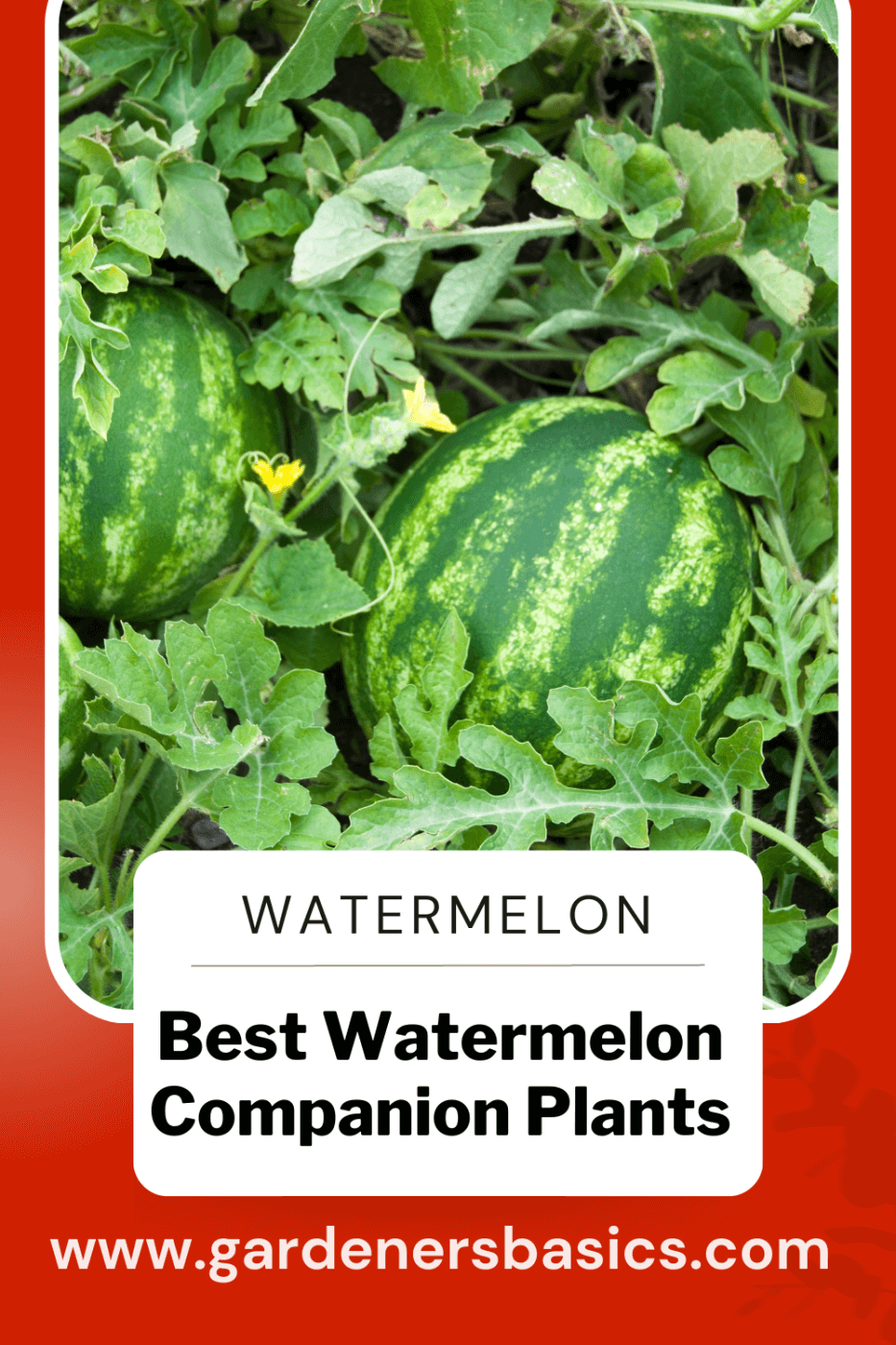 FAQ: Best Watermelon Companion Plants
FAQ: Best Watermelon Companion Plants
What are companion plants, and why are they important for watermelons?
Companion plants are plants that are grown alongside another plant to provide various benefits like improved growth, pest control, and pollination. When it comes to watermelons, choosing the right companion plants can help with their overall health, yield, and flavor.
What are some good companion plants for watermelons? A2: Some great companion plants for watermelons include corn, beans, sunflowers, radishes, nasturtiums, marigolds, and various herbs such as oregano, dill, and basil.
How does corn benefit watermelon plants?
Corn provides shade and support for the watermelon vines, protecting them from harsh sun rays. Additionally, corn can act as a natural trellis, encouraging the watermelon vines to climb and utilize space efficiently.
Why are beans a good companion plant for watermelons?
Beans are nitrogen-fixing plants, meaning they can convert atmospheric nitrogen into a form that is usable by other plants. This increases the available nitrogen in the soil, which promotes healthy growth in watermelon plants.
How do sunflowers benefit watermelon plants?
Sunflowers provide shade and support for watermelon vines, much like corn. They also attract pollinators, such as bees, which can help increase watermelon pollination and fruit production.
Why are radishes considered a good companion plant for watermelons?
Radishes can help deter pests, such as cucumber beetles and aphids, that may harm watermelon plants. Additionally, radishes have a short growth cycle and can be harvested before the watermelon plants need more space.
How do nasturtiums and marigolds benefit watermelon plants?
Nasturtiums and marigolds can help repel common pests, like aphids and squash bugs, that might damage watermelon plants. They also add visual appeal to the garden and attract pollinators.
How do herbs like oregano, dill, and basil help watermelon plants?
These herbs can deter pests and attract beneficial insects, such as ladybugs and lacewings, that prey on pests harmful to watermelon plants. They also help with overall garden health and add fragrance to the garden.
Are there any plants that I should avoid planting near my watermelon plants?
Yes, avoid planting watermelons near potatoes, as they can compete for nutrients and water. Additionally, plants from the Cucurbitaceae family, like cucumbers, pumpkins, and squash, should not be planted too close to watermelon plants to prevent the spread of pests and diseases.
How far apart should I plant my watermelon companion plants?
The ideal distance between companion plants and watermelon plants depends on the specific plants and their growth patterns. Generally, allow enough space for each plant to grow without overcrowding. For example, corn and sunflowers should be planted about 12-15 inches apart from watermelon plants, while smaller plants like herbs and radishes can be planted closer, around 6-8 inches apart.



